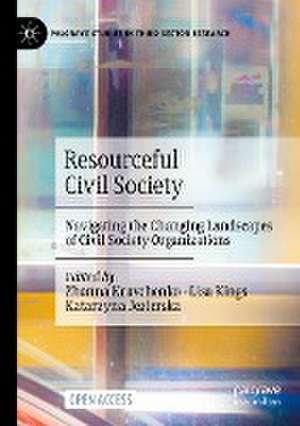Resourceful Civil Society: Navigating the Changing Landscapes of Civil Society Organizations: Palgrave Studies in Third Sector Research
Editat de Zhanna Kravchenko, Lisa Kings, Katarzyna Jezierskaen Limba Engleză Paperback – 9 iun 2022
| Toate formatele și edițiile | Preț | Express |
|---|---|---|
| Paperback (1) | 356.87 lei 6-8 săpt. | |
| Springer International Publishing – 9 iun 2022 | 356.87 lei 6-8 săpt. | |
| Hardback (1) | 429.61 lei 6-8 săpt. | |
| Springer International Publishing – 9 iun 2022 | 429.61 lei 6-8 săpt. |
Preț: 356.87 lei
Nou
Puncte Express: 535
Preț estimativ în valută:
68.30€ • 70.39$ • 57.67£
68.30€ • 70.39$ • 57.67£
Carte tipărită la comandă
Livrare economică 03-17 martie
Preluare comenzi: 021 569.72.76
Specificații
ISBN-13: 9783030990091
ISBN-10: 3030990095
Pagini: 366
Ilustrații: XIX, 366 p. 9 illus., 8 illus. in color.
Dimensiuni: 148 x 210 x 28 mm
Greutate: 0.46 kg
Ediția:1st ed. 2022
Editura: Springer International Publishing
Colecția Palgrave Macmillan
Seria Palgrave Studies in Third Sector Research
Locul publicării:Cham, Switzerland
ISBN-10: 3030990095
Pagini: 366
Ilustrații: XIX, 366 p. 9 illus., 8 illus. in color.
Dimensiuni: 148 x 210 x 28 mm
Greutate: 0.46 kg
Ediția:1st ed. 2022
Editura: Springer International Publishing
Colecția Palgrave Macmillan
Seria Palgrave Studies in Third Sector Research
Locul publicării:Cham, Switzerland
Cuprins
1. Introduction, Zhanna Kravchenko, Lisa Kings and Katarzyna Jezierska.- Part I. Resources as Constraints.- 2. Pecunia olet: The funding dilemma for think tanks in Poland, Katarzyna Jezierska.- 3. Domestic funding for civil society in a non-democratic context: The example of the Presidential Grants in Russia, Yulia Skokova and Christian Fröhlich.- 4.Polish human rights organizations: Resisting institutional pressures, Zhanna Kravchenko, Katarzyna Jezierska, Marta Gumkowska, Beata Charycka, and Magdalena Szafranek.- 5. . Rural community development in Sweden: From challenging to mainstream?, Anette Forsberg.- Part II. External Constraints and Facilitators of Resources- 6. From local to digital and back: E-resourcefulness among urban movements in Poland, Anna Domaradzka.-7. Between autonomy and compliance: The organizational development of Russian civil society, Vsevolod Bederson and Andrei Semenov.- 8. Navigating contemporary developments in Swedish civil society: The case of Save the Children Sweden, Lisa Kings.- 9. Humane resources? The people behind Polish civil society organizations, Galia Chimiak.- Part III. Organizations and Resources: Intertwined Transformations.- 10. Doing the right things or doing things right? Exploring the relationship between professional autonomy and resources in volunteering, Cecilia Gullberg and Noomi Weinryb.- 11. Liberty, loyalty, and solidarity. The role of transnational, national, and local resources in voluntary organizations in Russia, Zhanna Kravchenko.- 12. Resources shifting values: Online and offline resources in Swedish civil society, Håkan Johansson and Gabriella Scaramuzzino.-Chapter.- 13. St. Petersburg LGBTQI+ activists negotiating financial and symbolic resources, Pauliina Lukinmaa.-Chapter 14. Epilogue, Apostolis Papakostas
Notă biografică
Zhanna Kravchenko is Associate Professor of Sociology at Södertörn University, Sweden. She has published on various aspects of societal transformation in Russia. Her current research examines the development of civil society, with a particular focus on the role of transnational funding for civil society organizations working with human rights and democracy.
Lisa Kings is Associate Professor of Social Work at Södertörn University, Sweden. She has conducted extensive empirical and theoretical research in the field of civil society, including urban social movements. Her recent work focuses on action research and connecting academic research to civil society practice.
Katarzyna Jezierska is Associate Professor of Political Science at University West, Sweden. Her research interests center on the intersections between civil society and formal politics. She has published on radical democratic subjectivity, think tanks’ involvement in policymaking, and the engagement of diplomats with civil society actors.
Lisa Kings is Associate Professor of Social Work at Södertörn University, Sweden. She has conducted extensive empirical and theoretical research in the field of civil society, including urban social movements. Her recent work focuses on action research and connecting academic research to civil society practice.
Katarzyna Jezierska is Associate Professor of Political Science at University West, Sweden. Her research interests center on the intersections between civil society and formal politics. She has published on radical democratic subjectivity, think tanks’ involvement in policymaking, and the engagement of diplomats with civil society actors.
Textul de pe ultima copertă
Zhanna Kravchenko is Associate Professor of Sociology at Södertörn University, Sweden. She has published on various aspects of societal transformation in Russia. Her current research examines the development of civil society, with a particular focus on the role of transnational funding for civilsociety organizations working with human rights and democracy.
Lisa Kings is Associate Professor of Social Work at Södertörn University, Sweden. She has conducted extensive empirical and theoretical research in the field of civil society, including urban social movements. Her recent work focuses on action research and connecting academic research to civil society practice.
Katarzyna Jezierska is Associate Professor of Political Science at University West, Sweden. Her research interests center on the intersections between civil society and formal politics. She has published on radical democratic subjectivity, think tanks’ involvement in policymaking, and the engagement of diplomats with civil society actors
Lisa Kings is Associate Professor of Social Work at Södertörn University, Sweden. She has conducted extensive empirical and theoretical research in the field of civil society, including urban social movements. Her recent work focuses on action research and connecting academic research to civil society practice.
Katarzyna Jezierska is Associate Professor of Political Science at University West, Sweden. Her research interests center on the intersections between civil society and formal politics. She has published on radical democratic subjectivity, think tanks’ involvement in policymaking, and the engagement of diplomats with civil society actors
Caracteristici
Focuses on the role of resources in the function of CSOs Builds on a broad range of methods, such as document analysis, observations, interviews and surveys Challenges assumptions about the demise of civil society and points to future development This book is open access, which means that you have free and unlimited access





